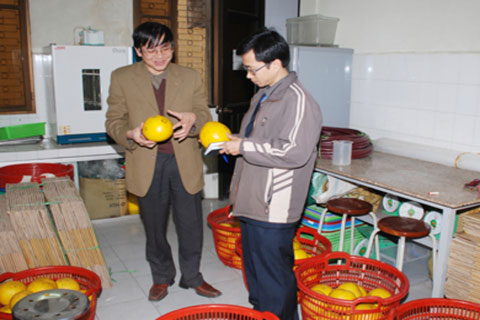Preserving fresh fruits and vegetables like picking
The new film forming technology allows to keep fresh fruits and vegetables as new.
This research product of the Institute of Agricultural Electrical Engineering and post-harvest technology - Ministry of Agriculture and Rural Development (MARD).
>>>Japan is about to unveil a vegetable preservation capsule
This technology is applied experimentally on Vinh cam in Dong Tao commune - Khoai Chau (Hung Yen). This is the second time this locality has applied this technology with fruits such as Vinh orange, Dien grapefruit .

Creating biological membrane to preserve fruits (Photo: Hung Yen Newspaper)
Through experimentation, simple and convenient ways of doing things; Post-harvest products are very fresh, regular fruits, bright yellow, stalks are still green, no stalks are lost, about 90% of form is compared to when picking. When the orange tonic, keep the aroma of essential oil of Vinh as recently harvested.
Membrane preparation is a liquid that can be used directly by spraying, rubbing, dipping, rolling the plate to create a thin layer on the surface of the fruit.
Membrane products are capable of slowing respiration, reducing natural dehydration, slowing ripening or aging of fruits, keeping fruits quality, less variation in hardness and smell.
According to Dr. Nguyen Duy Lam, Institute of Agricultural Electrical Engineering and Post-harvest Technology - Ministry of Agriculture and Rural Development said: materials for producing membrane compositions include: Beeswax, petals, fatty acids, ammonia solutions . One liter of inoculants 0.5 - 1 ton of fruit can be preserved.
The outstanding advantage of this technology is that it is inexpensive and easy to use due to the simple technology applied, does not require high-level human resources, wide scale of application because it can produce concentrated and household scale, environmentally friendly, safe for users .
Currently, the first production technology processes of 200 tons / year in Vietnam have started to operate.
- How to keep fresh vegetables without preservatives
- Fresh vegetables: How to use it for safety?
- It's hard to believe the sticker helps fresh fruit for 10 days longer and is absolutely safe!
- Fruits and vegetables cannot be stored together
- The scientific way of 'increasing life expectancy' for fresh fruits and vegetables
- Tips to keep fresh fruits after peeling and tending
- Things to know about fresh vegetables
- Notes to keep fruits and vegetables the most nutritious
- Are vegetables in the supermarket really fresh as you think?
- Technology keeps the flavor of frozen vegetables
- Eating lots of vegetables and fruits reduces the risk of death by 42%
- 8 types of summer vegetables should be included in your daily menu
 Why do potatoes have eyes?
Why do potatoes have eyes? 'Tragedy' the world's largest carnivorous life: Death becomes ... public toilet
'Tragedy' the world's largest carnivorous life: Death becomes ... public toilet Tomatoes were once considered 'poisonous' for 200 years
Tomatoes were once considered 'poisonous' for 200 years Detecting microscopic parasites on human face
Detecting microscopic parasites on human face